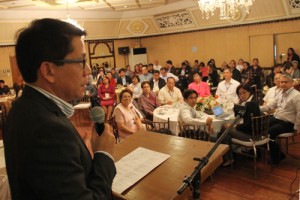AS thousands of college students stand to their scholarships because of the recent Supreme Court ruling that the Priority Development Assistance Fund (PDAF) or the pork barrel fund of lawmakers is unconstitutional, Rep. Roman Romulo of Pasig City filed two measures that aim to help students find other sources of fund so that they can finish their studies.
Romulo, House committee chair on education, said the Unifast Bill and the Voluntary Students Loan Bill which he filed in Congress will allow students to avail themselves of financial assistance from public and private funds.
The Unifast Bill, whose funding will come from the national government, will provide scholarships and grants-in-aid loans for the students.
“This measure is very helpful because most of our students cannot continue their studies because they lack financial resources,” Romulo said in his keynote speech during the general assembly of the Philippine Association of private Schools, College and Universities (Papscu) at Club Filipino in Greenhills, San Juan City.
Under the voluntary student loan program, the government will give tax incentives to private banks and financial institutions who will lend money to the students.
“With this, we encourage private banks and financial institutions to lend money to the students as a college loan. We will give them tax breaks provided that they will lend money to the students,” Romulo.
“Aside from the public funding, they [scholars] can also apply for loan from the private sector as well. Secondly, the participating private banks will make sure that these students can finish their studies simply because they have borrowed their tuition from them,” he explained.
Romulo said it is up to the participating private banks to set the requirements for student borrowers.
For his part, Papscu President Dr. Jose Paulo Campos said the student financing is an important component of the educational system since a large portion of the population is poor.
“Student financing is a critical component in making our educational system more dynamic because, right now, all support is channeled through government educational institutions in the form of reduced tuitions. So in effect, we had tie grant.
If you want to get government support you have to go into one of the state universities and colleges or a local government school,” Campos said.


